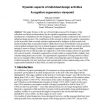Free Online Productivity Tools
i2Speak
i2Symbol
i2OCR
iTex2Img
iWeb2Print
iWeb2Shot
i2Type
iPdf2Split
iPdf2Merge
i2Bopomofo
i2Arabic
i2Style
i2Image
i2PDF
iLatex2Rtf
Sci2ools
CORR
2007
Springer
2007
Springer
Dynamic aspects of individual design activities. A cognitive ergonomics viewpoint
This paper focuses on the use of knowledge possessed by designers. Data collection was based on observations (by the cognitive ergonomics researcher) and simultaneous verbalisations (by the designers) in empirical studies conducted in the context of industrial design projects. The contribution of this research is typical of cognitive ergonomics, in that it provides data on actual activities implemented by designers in their actual work situation (rather than on prescribed and/or idealised processes and methods). Data presented concern global strategies (the way in which designers actually organise their activity) and local strategies (reuse in design). Results from cognitive ergonomics and other research that challenges the way in which people are supposed to work with existing systems are generally not received warmly. Abundant corroboration of such results is required before industry may consider taking them into account. The opportunistic organisation of design activity is taken her...
| Added | 13 Dec 2010 |
| Updated | 13 Dec 2010 |
| Type | Journal |
| Year | 2007 |
| Where | CORR |
| Authors | Willemien Visser |
Comments (0)

